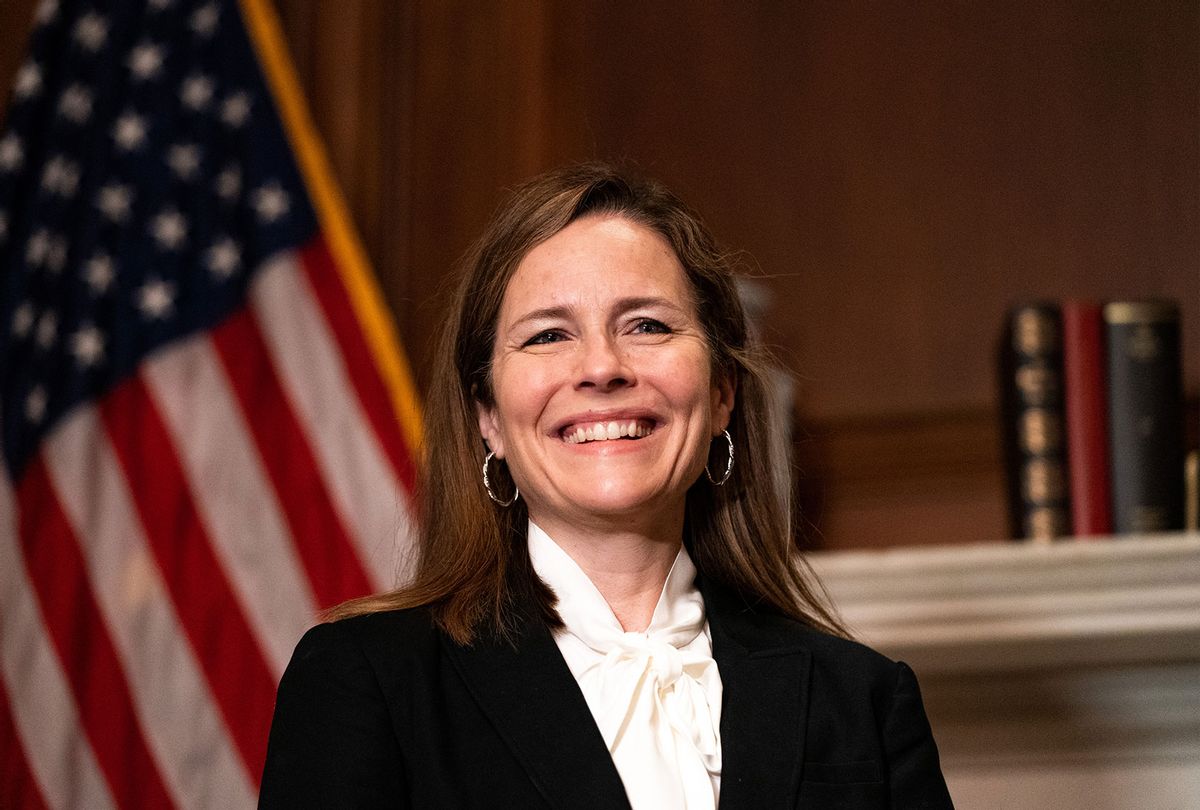On Monday, Justice Amy Coney Barrett refused to recuse herself from a Supreme Court case involving a dark money group that supported her, despite demands from top Democrats to do so because of her apparent conflict of interest.
The case, Americans for Prosperity Foundation v. Bonta, was brought by the conservative political advocacy group Americans for Prosperity Foundation, which is arguing against the constitutionality of California law that would compel the group to produce a list of its donors for state officials, according to Forbes. Last year, the Koch-backed Americans for Prosperity Foundation launched a seven-figure ad campaign urging the Senate to quickly confirm Barrett following the death of the late Justice Ruth Bader Ginsburg.
Barrett's refusal comes in spite of calls from top Democrats to remove herself from the case over fears that her personal connection to Americans for Prosperity Foundation would sway her judgment. Sen. Sheldon Whitehouse, D-R.I., Sen. Richard Blumenthal, D-Conn., and Rep. Hank Johnson, D-Ga., recently penned a personal missive to Barrett urging the justice to extricate herself from the case – or at the very least, make public her reasons for refusing to do so.
"Statute, constitutional case law, and common sense all would seem to require your recusal from [the case]," the Senators wrote last week. "At a minimum, there should be a public explanation as to why you think recusal is not required under federal law, since your participation in the case on these facts would appear to both conflict with 28 U.S.C. § 455 and effectively overturn [relevant case law]. Understanding this determination will also aid Congress in its ongoing consideration of judicial ethics and transparency rules."
"The American people are alarmed about the seemingly dominant influence of special interests on our politics and government," the trio added.
According to Forbes, Barrett did not respond to the letter.
"Justice Barrett is ignoring important ethical standards to rule on a case that could open our democracy to further infiltration by dark-money influence, perhaps permanently," Whitehouse told Forbes. "Her choice to press forward in spite of recusal laws also creates a troubling new precedent, and undermines public confidence in the integrity of the Court."
At the heart of the case is whether mandatory disclosure laws for dark money groups – which are allowed to raise unlimited amounts of money from undisclosed sources – would violate the First Amendment. Opponents of mandatory disclosure laws have argued that such requirements would make donors vulnerable to harassment and coercion from outside forces.
"Americans shouldn't have to choose between staying safe or speaking up," said Americans for Prosperity Foundation CEO Emily Seidel. "History shows us the ability to maintain privacy makes it possible for people to join together on causes and in movements. That was the case for the Civil Rights movement, marriage equality, and is still the case today. Especially in a polarized climate, the work of addressing injustice and advocating for change is hard enough without people facing fear of harassment and retaliation from the government and from potentially violent opposition."
On Monday, Chief Justice John Roberts expressed concern for mandatory disclosure laws surrounding controversial charities, according to Slate. "People have said they will make life miserable for anybody who supports that charity," he argued. "They'll picket outside their house. They will boycott anybody doing business with them."
It should be noted, however, that boycotts and pickets are examples of constitutionally protected speech under the First Amendment. As Mark Joseph Stern put in Slate: "[Conservative justices] are favoring the ostensible free speech rights to big donors to give money in secret over the free speech rights of the public to criticize those donations."
More than this, the case merely concerns disclosure laws that would turn donation records over to state officials; they would not make such records public, significantly lessening the chances of public threat.
The 6-3 conservative majority in the judiciary is likely to spell a win for Americans for Prosperity Foundation, as multiple conservative justices on Monday pushed back against California attorneys arguing for mandatory disclosure laws. A win would maintain the status quo around dark money, which has seen hundreds of millions of dollars influence the makeup of every branch of the federal government.



Shares